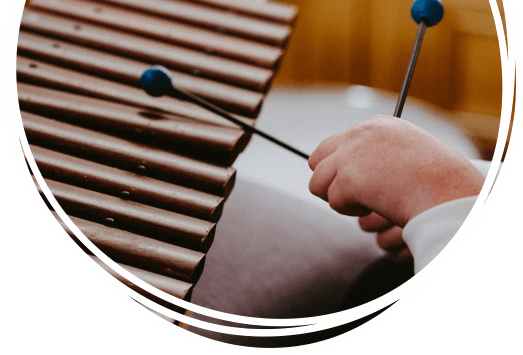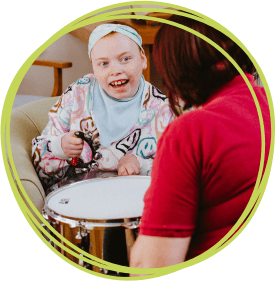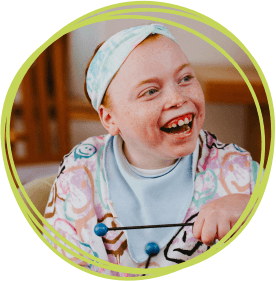Music binds us together at times of great joy and enormous sadness
In 2013, we introduced music therapy into our Little Bridge House hospice, and now thanks to the ongoing fundraising and financial support from our communities, we now offer music therapy across all 3 of our hospices.
How does music therapy benefit?
Music not only affects our heart rate, it stimulates and invigorates the senses and can help to relax and de-stress.
Music therapy sessions at Children's Hospice South West open up wonderful possibilities for engagement and interaction with the children.
It offers a space in which children can communicate and express themselves, through words if they are able to, but also in non-verbal ways through vocalisation, body language and facial expressions.
The child is at the heart of every session and they are in control of how the session runs. Some children may choose to make up a song about how they are feeling; others will simply sit quietly in the therapeutic space and to spend time away from all the medical interventions they have to face on a daily basis.
The focus is put on what children can do rather than what they are not able to do. Children will often leave the sessions with a big smile on their face, having achieved something they never thought they could.
How does it work?
The role of the Music Therapist is to respond to the children and the sounds they offer, mainly through improvisation; with singing and a wide range of musical instruments, from drums to keyboard, to guitar and all manner of percussion instruments. Music technology is also used to enable our young people to engage in the process and express something of who they are.
Often a session might explore the sights, sounds, textures and vibrations of places that you and I take for granted, but that are so difficult to access with the children. Story bags are made to help offer a sensory experience, such as The Beach which offers the children opportunities to touch pebbles and sand, and The Jungle which uses a water dispenser to replicate an elephant spraying water from its trunk!
During a session, a child may be recorded or photographs are taken so that the families have something to look back on and enjoy in years to come.
Why is music so important?
Ceridwen, our lead music therapist at CHSW explains: “Music plays a huge part in all our lives. There is rarely a big life event that doesn't have music at the very centre of it. Music can express so much of what we are feeling and this is where the concept of music therapy is born.”
We also offer family-based music sessions as well and parents often comment on what the music therapy sessions mean to them. Sam’s mum says of his music therapy sessions: “We’ve always known that Sam loves music but particularly his determination to physically interact and his co-ordination to touch an instrument, such as the harp, has been a pleasant surprise.
I actually feel very emotional to see such a profound response from him. Our son and many other children we have met seem to be able to respond to music and interact on a level they cannot do through any other medium."
The music therapy sessions offer something else that goes beyond the moment itself, they create very precious memories for families.
It offers opportunities for children and us as their families to experience something very special together and creates wonderful memories to treasure forever.
You can now buy the gift of music and memories
A virtual gift is a unique and wonderful way to show your loved one as well as a child living with life-limiting condition and their family just how much you care.
How it works
Simply purchase your chosen cherished gift and you will receive a downloadable gift card that can be printed, personalised and passed on to your friend or family member.











